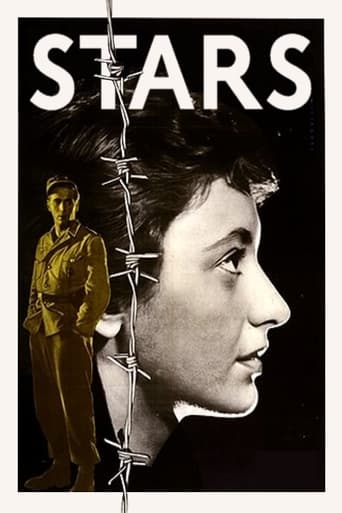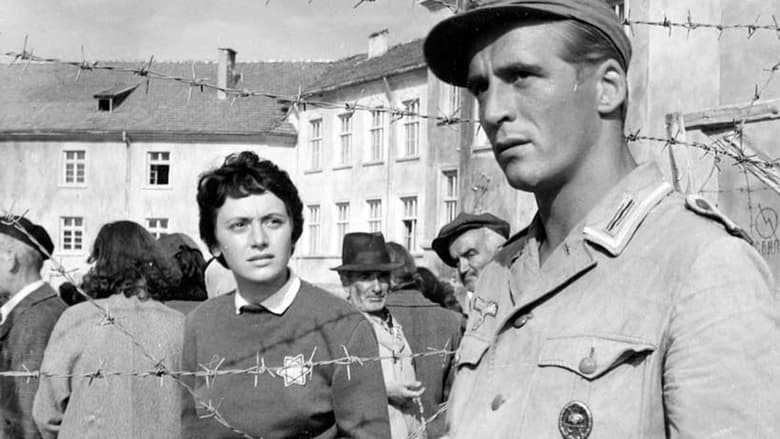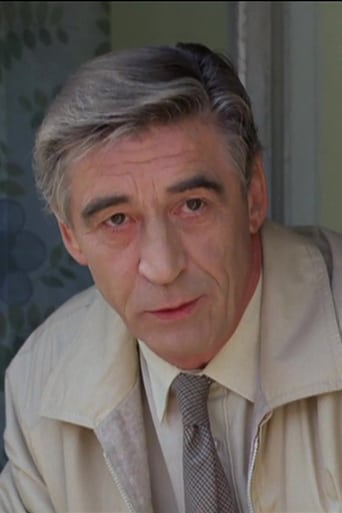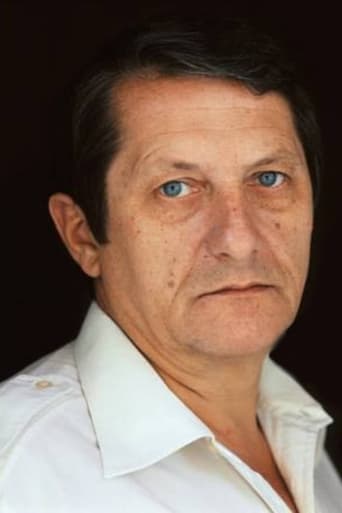

Stars (1959)
Stationed in a secluded Bulgarian village in 1943, Walter – a German Wehrmacht sergeant and artist – lives in almost idyllic distance from the war. Then a transit camp is set up for Jews arriving from Greece. When Ruth, one of the internees, asks Walter to help a pregnant woman, the two form an unlikely bond.
Watch Trailer
Cast


Reviews
I wanted to but couldn't!
It's fun, it's light, [but] it has a hard time when its tries to get heavy.
It’s sentimental, ridiculously long and only occasionally funny
I enjoyed watching this film and would recommend other to give it a try , (as I am) but this movie, although enjoyable to watch due to the better than average acting fails to add anything new to its storyline that is all too familiar to these types of movies.
This East German film by Konrad Wolf did not reach the West until after the Cold War, and is rarely seen today. It concerns the story of a corporal, named 'Walter' (although his real name is never known) and played by Jürgen Frohriep with quiet complexity, and his relationship with interred German Jewess Ruth (played by the beautiful and powerful Sasha Krusharska) against the background of Nazism in Bulgaria, populated by inhuman oafs like Kurt (a repellent character played well by Erik S. Klein), and freedom fighters like Petko (Stefan Pejchev) and Blashe (Georgi Naumov).The film was made in 1959, centering on events in 1943, when the Jews were rounded up, held prisoner, and eventually shipped to the death camp at Auschwitz. It does not flinch from their predicament, denied medicine, herded together like cattle, huddled quietly and hopelessly in congested rooms. The music score uses Jewish songs to pinpoint the action and underline scenes which are otherwise silent - panning along the faces of the refugees in their dignified acceptance of their situation, or following the death transports as the men, women, and children are packed into carriages and sent away from Bulgaria like animals going to the slaughter.The power of this film is in its matter-of-fact treatment of what the Germans did to their Jewish countrymen and compatriots, in the name of racial purity, and how out of this one human relationship between - on the surface of it - enemies could grow and flourish. This concentration on Walter and Ruth makes the ending (also the beginning of the film, before the flashback) all the more poignant and touching.
Yes, I saw this film myself back in Calcutta, India at the Goethe Institut. Unfortunately films such as these do not have any kind of DVD/VHS distribution at all. And that's not unusual. As I write, even the more well-known of the East European directors like Andrzej Wajda, Krzystof Zanussi have so little distribution. So no wonder others are relatively unheard of. Among the East Germans like Konrad Wolf (director of this one), I think Frank Beyer has one on DVD (Jakob the liar - that too probably after the success of its English remake), and Wolfgang Staudte has one with his 1946 masterpiece - The murderers are among us. Sorry I spoke so little about the film itself, but it's so frustrating that European arthouse is so much subordinated to Hollywood.
I saw this modest yet powerful film at Occidental College over a decade ago. There were only about two dozen people in the small classroom. There couldn't be a greater contrast with Hollywood's blockbusters. Instead of tormenting us with the horrors of war, this small screen, black and white film envelops us in a cozy intimacy and tries to reach for our deepest humanity and sense of poetry. We get the feeling that war is above all a profound shame, and that everyone is human. That's much more powerful than seeing a lot of combat footage. Small films like this do not even register on the radar of a jaded public. If they are not promoted by discerning people, they will fade into oblivion. Ironically, the most tragic thing about this film, is that it fails to make an impact. Don't you believe that the cream always rises to the top.
First of all an almost unthinkable idyll is presented to the spectator, considering that we are in times of war: A sergeant named Walter and his superior Kurt are far off the combat action and supervise civil workers in a small Bulgarian town, where they are also responsible for a community of Greek Jews, waiting to be transported to their final destination. This happy constellation encourages Kurt to nothing else but to find intensified sensual pleasures in dissipated carousals, gluttonous feasts or with local prostitutes, whereas Walter experiences an important dawning of consciousness that will change his life.The decisive turning point is his encounter with Ruth, a Jewish girl that asks for his help when a pregnant woman of the captivated community is about to give birth. It is her who succeeds in getting going again the humanitarian mechanisms that Walter seemed to have forgotten. For he quite unexpectedly smuggles a civilian obstetrician into the camp, just one day after he has refused her request in the curt coldness that is typical for Third Reich soldiers. Could it be possible that Germans are human, after all?Or maybe it's just another love adventure that Sergeant Walter is after. At least there are night dates about which the sensual Kurt goes green with envy: Walter and Ruth meet several times for an extensive walk across the deserted streets of the town, where they are unnecessarily guarded by a soldier, who is walking discreetly behind.Surely, this provokes certain expectations of the public, but, of course, we definitely aren't in a Hollywood movie. The usual boy-meets-girl-plot, which almost in any case culminates in some sort of physical love making, is replaced by long-winded dialogues of philosophical content, which in the end are responsible for a spiritual approximation of two characters who initially seemed to be incompatible. These verbal encounters become the true highlights of a quiet and smoothly developing movie that deliberately abstains from intricate plot movements.Walter and Ruth predominantly discuss the question, whether there is room for any changes. Is it possible to eradicate evil? In view of the impending deportation of the Jewish community to Auschwitz every kind of hope seems nonsensical and foolish. "Evil is eternal, that's exactly what it is," Walter disheartenedly insists. But Ruth convinces him that it is the duty and the responsibility of every human being to revolt against the evil forces.Man left to his own devices is powerless though. Walter finally has to recognize this when he reaches the railway station a moment too late: The train with the Jews has just left, and he can only run behind, without the slightest chance to catch up with it. The only thing that remains and reminds him of Ruth is her torn off star of David, which is lying neglectedly in a dark puddle, only slightly illuminated by the cold light of the night sky. It is the ironic confirmation of what she has said before: "Every human being has got a protective star in the sky, but once you rip it off from its place, Man can do nothing but perish."Nevertheless Walter isn't to be discouraged by that saddening realization and the subsequent tragedy which he is unable to prevent. At the end of the movie he continues on the road once taken and the determination with which he supports the Bulgarian partisans seems logical. Maybe through the collaboration with others he will achieve something which was denied to him when he was still fighting on his own: to defy evil and help to create a more humane world.




